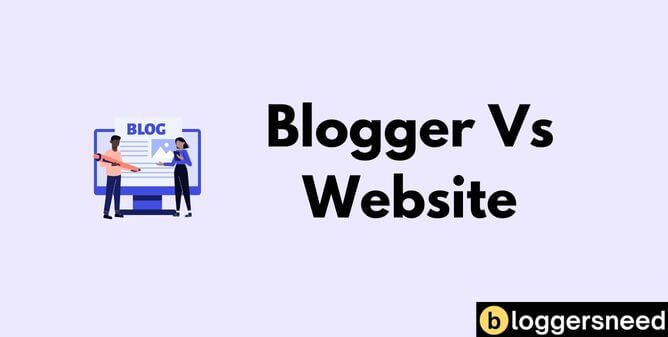
As a blogger, I’m sure you’ve heard the debate between blog vs website. But what’s the difference? Which one should you choose for your online presence?
In this article, we’ll explore both options and help you decide which is right for you.
Websites have been around since the early days of the internet while blogs are relatively new. Both can help build an online presence, but they do it in different ways.
We’ll explain how each works and discuss their advantages and disadvantages so that you can make an informed decision about which option is best suited to your needs.
Table of Contents
What is the Difference Between a Website and a Blog?
When it comes to content, a website usually has static information, while blogs often publish content like articles, reviews and opinions.
The audience for a website is generally wider, while a blog has a more targeted and engaged audience.
The purpose of a website is more for broadcast, while a blog is more for conversation and engagement.
Design-wise, a website often looks cleaner and more organized, while a blog is more casual and often more visually engaging.
Blogs tend to be updated more frequently, while websites are often updated less regularly.
Ownership of a website is usually more business-oriented, while blogs are often more personal.
Websites usually use HTML and other programming languages, while blogs often use a blogging platform like WordPress, Wix, Blogspot, etc.
The format of a website tends to be more structured, while a blog is often more informal.
Websites typically have more advertising, while blogs usually have less.
Social media integration is often a focus for blogs, while websites may or may not have social media.
Websites tend to be less interactive, while blogs often have commenting and other interactive features.
Updates to a website may require more technical know-how, while updates to a blog can often be made more quickly and easily.
Hosting a website often requires more resources, while blogs can often be hosted for free.
Content
Content is a major factor that sets websites and blogs apart from one another.
Websites are usually static, meaning the content isn’t changed frequently. The main focus of websites is to provide information about products or services to potential customers through search engine optimization (SEO).
On the other hand, blog sites tend to be dynamic with frequent updates and user engagement opportunities such as comments, likes and shares.
Blogs also allow for more creative freedom in how you present your content, which can lead to increased visitor engagement on social media platforms like Facebook and Twitter.
Because of this interactivity between bloggers and readers, it’s easier for businesses to establish an online presence with a blog than a website.
So while both serve different purposes, they both have their place in today’s digital world.
Audience
Knowing your audience is key when it comes to websites and blogs.
Websites are typically more geared toward potential customers who have a specific goal in mind, such as finding out about products or services.
Whereas blog content has the ability to draw people in with its scope of topics that can range from creative writing to current events.
Plus, user engagement opportunities like comments, likes and shares on blogs give readers the chance to interact directly with the author and allows for conversations amongst them.
This level of interaction makes it easier for businesses to establish an online presence than if they were to use just a website alone.
So while both serve different purposes, it’s important take into account your target market before deciding which one will work best for you.
Purpose
So, when deciding between a website and blog for your content strategy, it’s important to consider the purpose of each option.
Websites are great for SEO optimization and presenting information about products or services in an organized way.
On the other hand, blogs can be used to engage with readers by sharing stories, experiences and even insights into current events.
Both have their advantages depending on the goal you’re trying to achieve – so ask yourself what do I want my audience to know?
That will help determine which platform is best suited for you.
Which Is Better A Blog Or Website?
If you are trying to decide whether I should create a blog or website for my project.
Then you should know about the differences between design, flexibility, maintenance, SEO, costs, usability, user experience, ownership, branding, security, exposure, content, publishing, reach, and audience.
It’s important to consider each of these factors when making a decision on what platform to go with.
Below I’ve explained about the three factors. Read below
Design
When it comes to the debate of whether a blog or website is better, one major aspect to consider is the design.
The user experience plays a crucial role in determining how successful your platform will be. Aesthetics and functionality are key elements that should never be ignored when creating either a blog or website.
You want to ensure that visitors can access all features with ease while having an enjoyable time navigating through pages. Remember, first impressions matter, so make sure your site has an inviting look and feel without compromising its purpose for existing.
Flexibility
Now, let’s talk about another aspect that can influence your decision on whether to create a blog or website – flexibility.
When it comes to customization options and content structure, both platforms have their advantages and disadvantages.
Blogs typically have pre-designed templates that allow for easy customization with just a few clicks. This makes them ideal for those who want to focus more on creating engaging content rather than spending time designing the site.
However, blogs may not offer as much flexibility when it comes to customizing certain features such as navigation menus or page layouts.
On the other hand, websites offer greater flexibility in terms of design and functionality since they are built from scratch. You have complete control over how you want your site to look and feel.
Additionally, websites allow for more complex structures such as e-commerce stores or membership sites which may not be achievable with a simple blog platform.
In summary, while blogs provide quick and easy access to publishing content without being too technical, websites are better suited if you require specialized functions like selling products online or providing exclusive member-only content.
Ultimately, it all boils down to what goals you aim to achieve through your digital presence.
Maintenance
Now that we’ve talked about the flexibility of blogs and websites, let’s move on to another important aspect – maintenance.
As someone who has managed both a website and a blog, I can attest that they require different levels of upkeep.
Maintaining a website means having to handle everything from server updates to security patches, while blogger maintenance is more focused on content creation and promotion via outreach, Guest post, SEO.
It’s worth noting that keeping your digital presence up-to-date takes time and effort regardless of whether it’s a blog or website.
So, let’s dive into how each platform stacks up in terms of maintenance requirements without further ado.
Can I Build A Website Or Blog On My Own?
If you’re considering building your own website or blog, the good news is that it’s entirely possible to do so.
Thanks to DIY website builders and blogging platforms like WordPress, Wix, and Squarespace, creating a website from scratch has become more accessible than ever before.
One of the benefits of using these services is that they often come with pre-built templates that make designing your site a breeze. Additionally, many of them offer customization options that allow you to add unique features specific to your needs.
So whether you want to start a fashion blog or create an online store for your handmade crafts, there’s likely a platform out there designed specifically for you.
With some time and patience (and perhaps a few YouTube tutorials), anyone can build their own website or blog without needing any coding experience whatsoever.
How To Start A Blog On WordPress?
If you have doubts like,
I’m interested in starting a blog on WordPress, and I’m not sure how to go about it.
I think the first step is to decide whether you want to create a website or a blog – this will help you decide what type of domain you should choose.
Once you have your domain, you’ll need to set up WordPress and add the content.
Choosing A Domain
Choosing a domain for your WordPress blog is one of the most important decisions you will ever make.
Your domain name should be memorable, easy to spell, and relevant to your content.
Before registering your domain, consider which extension would work best for you – .com, .net, or .org. Want a discount? Check out this namecheap promo codes.
If you’re running a commercial site, then a .com extension might be more appropriate.
However, if you are setting up a non-profit organization, then it’s better to go with a .org extension.
Do some research on available domains before making a decision; sometimes changing just one letter can mean the difference between an unforgettable brand name and something generic that no one remembers.
Remember that your choice of domain will impact how people perceive your website/blog so take time in choosing wisely!
Want a brandable domain name? Check out this best domain name generators.
Setting Up Wordpress
Now that you have chosen your domain name, it’s time to start setting up your WordPress blog! Don’t worry if you don’t have any technical experience; WordPress is designed to be user-friendly and easy to use.
One of the first things you’ll want to do is customize a template or theme for your blog so that it looks unique and eye-catching. There are tons of free templates available on WordPress, but if you want something more sophisticated, then you might consider purchasing a premium theme from one of the many third-party providers out there.
Another important aspect of starting a successful blog is optimizing it for search engines like Google. This involves doing some keyword research and making sure that your content is well-structured and includes relevant meta descriptions and title tags.
With these tips in mind, let’s dive into how to set up your own WordPress blog!
Adding Content
Now that you have your WordPress blog set up, it’s time to start adding content! After all, the heart of a successful blog is great content.
But where do you start? Don’t worry; there are plenty of content creation strategies out there to help guide you in crafting engaging and valuable posts for your readers.
And with so many blogging platforms available today, such as Wix or Squarespace, it can be helpful to compare them and see which one suits your needs best.
So let’s dive into some tips and tricks for creating compelling content on your WordPress blog!
Conclusion
In conclusion, the decision between creating a website or blog ultimately depends on your goals and needs. If you’re looking to showcase products or services with minimal updates, then a website may be more suitable for you.
However, if you want to create engaging content frequently and interact with readers effectively, then I would recommend starting a blog.
Regardless of which platform you choose, both can be built easily without requiring extensive coding skills. With platforms like WordPress available online, building your own website or blog is now easier than ever before!
So why wait? Take the first step towards your online venture today and start crafting amazing content that will captivate audiences worldwide!
Affiliate Disclosure: Some of the links in this post are affiliate links, which means I may earn a small commission if you make a purchase through those links. This comes at no extra cost to you. Thank you for your support!
